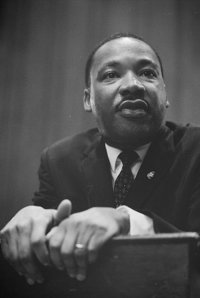
Yesterday would have been Dr. Martin Luther King Jr.'s birthday.
While the civil rights movement in the USA was led by Christians, it is easy to forget how many believers - particularly evangelicals in the South - did not support the efforts of Dr. Martin Luther King, Jr. His “Letter from Birmingham Jail” is well worth reading and reflecting on.
MLK wore the prophet’s mantle with courage and dignity, and for a generation, was the voice of a nation’s conscience. He was one of the great orators of his [of any] generation.
Here are the mp3 and text links to a couple of his major speeches:
“I Have A Dream” – 28 August 28 1963 (text)
This is one of those speeches that always stirs me. Not only is the content so right on, but the delivery puts my heart in my throat every time. When he gets to the ending cadence, “Let freedom ring”, my heart races. In the history of great speeches, this, for me, is at the top.
While "I Have A Dream" is what is often remembered, King went on to speak and write even more powerfully. In his book Why We Can't Wait (1964), King made this remarkable statement:
"Our nation was born in genocide when it embraced the doctrine that the original American, the Indian, was an inferior race. Even before there were large numbers of Negroes on our shores, the scar of racial hatred had already disfigured colonial society. From the 16th century forward, blood flowed in battles over racial supremacy. We are perhaps the only nation which tried as a matter of national policy to wipe out its indigenous population."
"A Time To Break Silence" - 4 April 1967 (text)
This powerful speech on Vietnam caused many within the civil rights movement, the media and the white house to accuse MLK of fusing two totally distinct problems. But King refused to back down. A reminder to our generation that issues are not distinct and seperate, but linked. Our approach to the sanctity of life must include all of life.
"I've Been To The Mountaintop" – 3 April 1968 (text)
The "Mountain" speech was delivered just 24 hours before his assassination. It carries what I think is the heart of King’s enduring legacy. It's not so much the criticism of the present circumstances, though he had plenty to say in criticism of racial inequity, it's the powerful clarity of his vision for a better way, the possibility that we might become a better people than we are.
It is easy to forget that King was only 39 years of age when he died. That he helped spark a racial revolution in American society before his assassination in Memphis is a testament to the power of his vision and the grandeur of his words. Not long before he died, King described how he would like to be remembered:
"I'd like someone to mention that day that Martin Luther King, Jr., tried to give his life serving others. I'd like somebody to say that day that Martin Luther King, Jr., tried to love somebody. l want you to be able to say that day that I did try to feed the hungry. I want you to be able to say that day that I did try in my life to clothe the naked. I want you to say on that day that I did try in my life to visit those who were in prison. And I want you to say that I tried to love and serve humanity."Some addition MLK Jr links
[Michael Eric Dyson, author and professor of religious studies at DePaul University]
The King Center
MLK Jr Research and Education Institute at Stanford
MLK - wilipedia
No comments:
Post a Comment